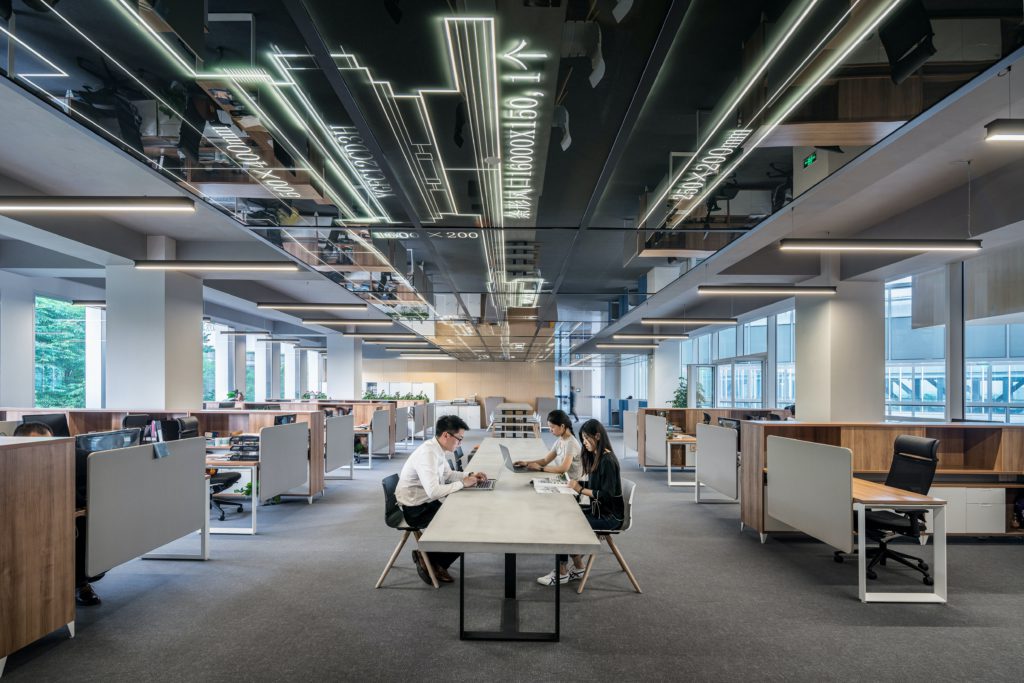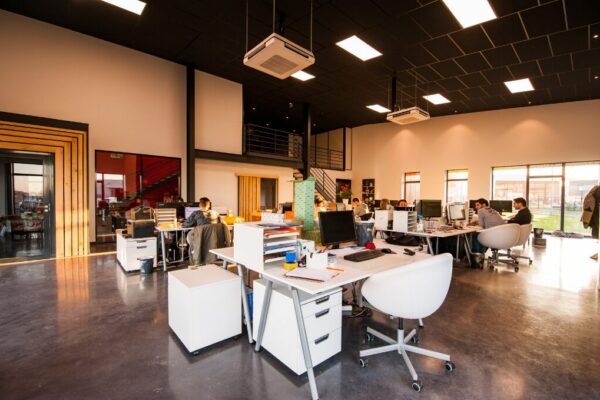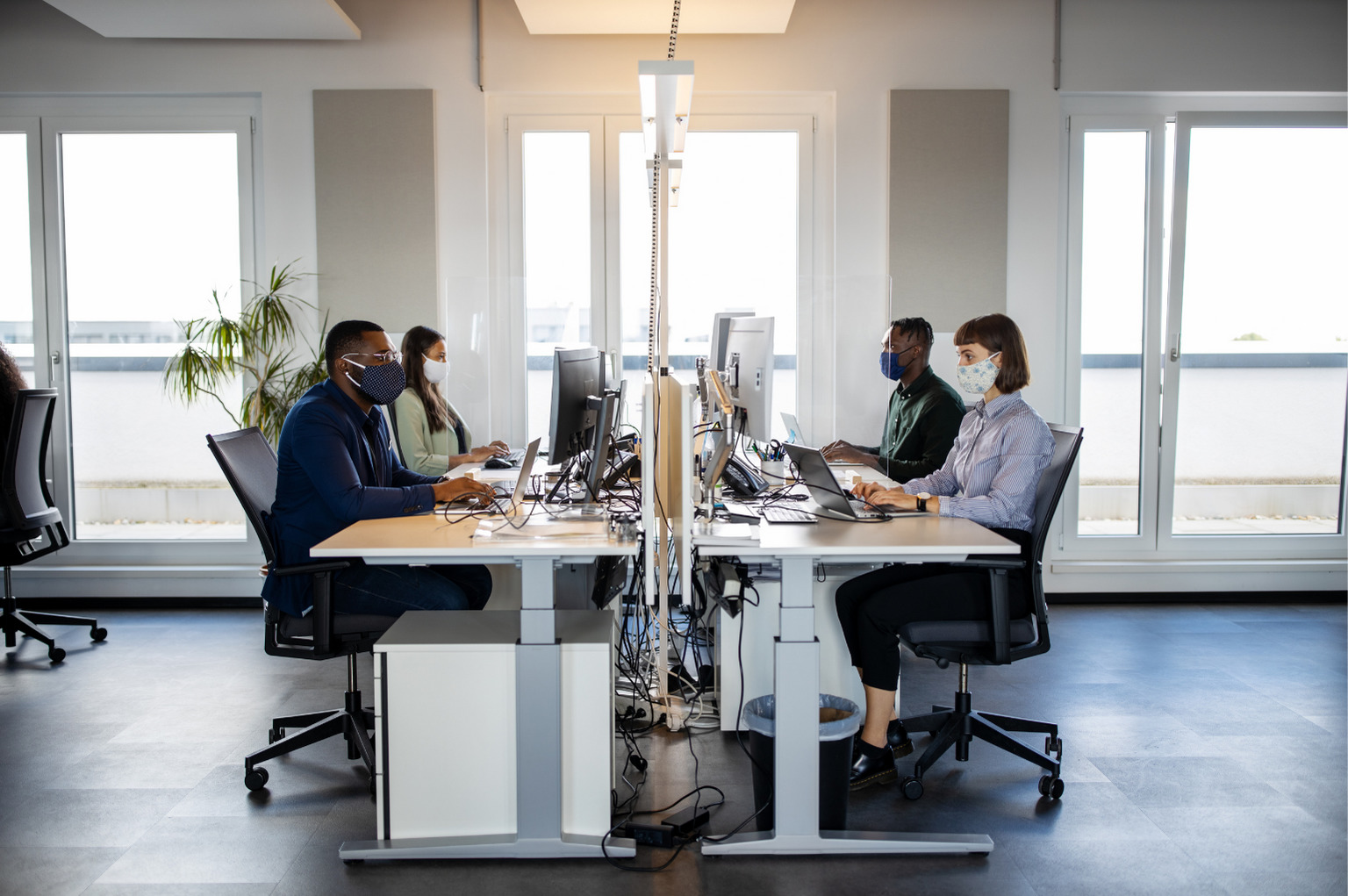As Ireland’s workers plan to go back to the office for the first time in over a year, the only current certainty is uncertainty. Following an eighteen month period of unprecedented obstacles, widespread remodifications to the workforce and increased concerns regarding employees’ welfare, a return to “normalcy” almost seems to be the most abnormal step to take at this time.
While it is no doubt a necessity to undergo this return, there are a number of factors that must be considered if it is to be a success. For one, businesses need make sure they have established the appropriate rules and regulations that will safely facilitate this return. To avoid the inevitable confusion, facilities managers and superiors alike must work out a hybrid schedule for their employees regarding who will stay at home, who will go back to the office and who will do a mix of both. In addition to this, managers must look at how to effectively combat employee the Covid-related anxiety that will go along with work.

Communication
As employees plan to go back to their offices for the first time in months, social distancing in the workplace will be a main concern for managers and supervisors nationwide at the moment. There are of course those who will remain at home, continue a hybrid form of working, and reap the undeniable benefits of a remote work schedule. These include less money spent on commuting, and more opportunity to deal with personal matters.
However, there are also disadvantages to this system that have proved damaging. Back in the early stages of Covid-19, as remote working first rose in popularity, it was quickly revealed that, in this system, any hope for extended relations relied heavily on significant usage of communication mediums such as Microsoft Teams and Zoom. As effective as these communications initially seemed, they were ultimately limited, as unfortunately there’s only so much that can be achieved in an important meeting on Zoom or Teams.
As a result, many employers and employees, having been starved of a sense of “normalcy”, will desire a full return to their physical workplaces to get back to the way things were, the so-called “good old days”. Social interactions, those that adhere to the necessary Covid-safe guidelines, will ultimately reaffirm a sense of camaraderie in the workplace, adding something vital that was missing over the past eighteen months.
The Importance of Communication
The communication line between employers and employees is a hugely critical factor. Whether in person or via Zoom, group meetings and one-on-one sessions under the influence of social distancing procedures would be greatly helpful to the confidence of workers. Right now, many are concerned with their impending return, anxious about the health concerns and worried that they may take the virus home with them, potentially endangering an elderly family member they are in direct contact with. By engaging in communication sessions with their employees regarding these health and safety measures, managers can ensure that their workers are not in the dark about such matters.
That being said however, in order for this to be the case, managers and superiors have to make a strong effort to ensure their communication lines with workers are as clear and effective as possible. In light of the past year, employees voices are now more important than ever before, and increased heeding of their demands and concerns will be hugely vital. If employers can make their communication lines with employees clear and efficient, by doing things such as having daily Covid-safe one-on-one, hour-long meetings, then this will go a long way to ensuring employee satisfaction is achieved. In turn, a happier and more productive workplace is surely a guarantee for the future.
Connection, Collaboration and Creativity
There will be other aspects of work life that will require addressing with employees back in the office. For example:
- A work environment that sees workers communicating more freely, albeit within necessary boundaries, will put the foundations together for greater workplace connection. I don’t think it’s unfair or inaccurate to say that one-on-one conversations are generally more intimate than Zoom calls. Now with offices populated once again, employers won’t have to schedule meetings with their employees. They will be able to converse more freely in open hours at any time, bolstering communication lines and the passing of significant information.
- In turn, greater connection will boost greater collaboration between employers and employees. With workers co-operating with each other in person, there’s greater potential for more substantial relationships to grow within the workplace, allowing for an environment defined by trust and productivity between managers and their underlings. As people collaborate with each other more freely and more openly as a result of established personal connections, creativity will be something that employers can also look forward to amongst their employees as time goes on. Managers can encourage their employees to confer and meet with each other as regularly as possible, while strictly adhering to Covid-rules, to ensure these aspects are successful in the new workplace.
Health Protocols
As it has been stated, as employees plan to go back to their offices, they will be greeted by a workplace much changed from the one they remember. However, this is not necessarily a bad thing, because now, greater concern is placed on health protocols. The health of employees has of course always been an important concern for managers and superiors alike, however now more than ever, employees will be looked after in ways they were not before. Whereas previously, management may have turned a blind eye or enforced only leniently the various procedures that should have been followed, regardless of whether or not there was a pandemic, now they are forced to ensure that their workers, in addition to themselves, are in the necessary state of health to do their jobs.

Quelling any potential spread of the virus, the extensive care given to such health measures will no doubt ease any fears employees may have about returning to the workplace for the first time in months. It will be the role of facilities managers nationwide to ensure these standards are met, that social distancing procedures are adhered to and effective. This in turn will make going back to the office an even more attractive option for the average working man or woman.
However it will be the effective adherence to these social distancing procedures that will determine the success of employees collectively returning to the office. While it is the manager’s responsibility to oversee adherence, the employee has the equally important role of following accordingly. At Ronspot, we utilise hoteling software to efficiently administer social distancing. Titled Ronspot Desk Booking System, this mobile app allows for employees to reserve a desk in their office space on a particular date. The app will show an interactive map of their office, and on this map, the employee can tap on the available desk he or she wishes to reserve, and then the desk is officially reserved, unable to be booked by anyone else. Usually completed within the space of five seconds, the app is a very quick, effective and useful tool to employ in ensuring social distancing.

Additionally, with this app, a cleaning report can be generated, in which case the reserved areas will be cleaned and sanitised by a professional cleaning team as soon as the employee is finished with their reserved desks. With the desk cleaned, it soon becomes available for the next allotted time, booked by another employee who has used the software. This effectively eliminates any chance for the spread of germs, which highlights how successful usage of this app could be a defining factor in bringing employees back to the office successfully.
Remote Working
Embracing remote working instead of completely shunning it in the face of this return could be vital in ensuring employee satisfaction. Employees cannot be expected to suddenly return to the offices permanently for the first time in over a year. A gradual process seems to be the best method forward. Managers could organise their schedule in such a way to allow a section of their employees to dedicate three working days out of five to the office, with the other two based at home. Over time, judging by the expected success of new health protocols set to be introduced, employees can gradually return to a full work schedule based in the office.
If a business does not already have one, now is the best time to introduce a remote working schedule into their workplace. Information from a July 2020 Facilities Managers Journal (FMJ) survey indicated that a staggering 61% of employees stated that they would prefer to continue working from home for the foreseeable future. In light of this information, it seems that a remote work schedule is the safest way to best encourage satisfaction, or at the very least contentment, as offices begin to fill up again.
The significance of hybrid working cannot be understated, and we at Ronspot understand this completely. Here, we have created a Flexwork app, which similar to the Ronspot Desk Booking System, is an effective user-friendly app. It allows for superiors to manage their employees, whether they are in the office or at home. Allowing for the effective overseeing that their working hours are being completed, the app allows employers to rid any concerns of laziness or complacency among their workers based at home.

Additionally, these innumerable changes will also give businesses an opportunity to reassess their performance goals, and set new ones amid the ever-changing landscape of the current workplace. Setting goals for specific individuals and larger teams alike would be a strong incentive for employees to be as productive as possible, especially when they are subsequently rewarded for their hard work. The use of OKR (Objectives and Key Results) software, such as gtmHub, has proven a burgeoning popularity among organizations, for example Virgin Incentives.
Conclusion
Employees can be happy knowing that they are returning to an office that places emphasis on their wellbeing, more so than ever. They can take comfort in the fact that they are more protected than ever, with arguably more independence than ever. User-friendly apps by companies like Ronspot allows for employees to put their health in their own hands, which in turn will significantly ease any fears about potential encounters with Covid-19. Given these and additional aforementioned factors, it seems the return to the office will be one grounded in cautious enthusiasm, rather than unbridled fear.
Having navigated our way through the last eighteen months of unrelenting uncertainty, it seems that now finally the future is bright ahead. Over the past eighteen months, we as a workforce have shown incredible unity in working together in face of such uncertainty and disarray. The next eighteen months will be no different, however, in this case, there is a visible light at the end of the tunnel, with the levels of uncertainty declining considerably.
See how Ronspot can solve your specific workplace challenges.














